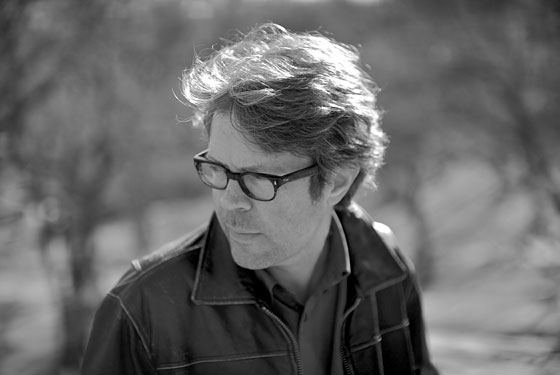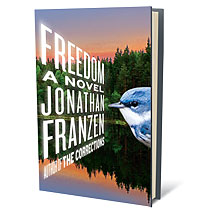
If you are a literate human who lives on planet Earth, you probably have an opinion about Jonathan Franzen’s The Corrections. It’s either an era-defining work of genius or an overhyped middlebrow soap opera—a bold reclamation of a classic genre (the realist family novel) or an irrelevant exercise in a dead form. The book was published nine very long years ago, and since then it’s been so thoroughly absorbed into the cultural bloodstream—its nutrients extracted, its husk discarded—that reading it again, or even thinking about it consciously, seems almost redundant. Franzen still appears, every once in a while, in the guise of a public crank, fulminating about cell phones and SUVs and (most recently) the slaughter of migratory birds. It’s easy to dismiss him as a known quantity: the grumpy bard (and poster boy) of repressed middle-class white Midwesterners. The Franzen aesthetic, which was already self-consciously retrograde back in 2001—before the rise of blogs and iPhones, when a 500-page novel seemed like a reasonable vehicle for reaching a mainstream audience—today seems just about Precambrian.
And yet here he comes again, with another 500-page novel that looks—from a distance—basically exactly like his last one. Freedom is a close cousin to The Corrections: a social-realist epic about a depressive, entropic midwestern family being swallowed and digested by the insatiable anaconda of modernity. The Corrections told the story of the Lamberts—Arthur and Enid and their three children. Freedom tells the story of the Berglunds—Walter and Patty and their two children. Instead of St. Jude (a proxy for St. Louis) we have St. Paul. Instead of a dubious get-rich-quick scheme exploiting the post-Soviet chaos in Lithuania, we have a dubious get-rich-quick scheme exploiting the war in Iraq. Like its predecessor, Freedom is heavy on psychology and extramarital affairs and earnest speechifying (capitalism, overpopulation, Israel). It is, in other words, classic Precambrian Franzen: a ready-made literary fossil. It’s hard not to be at least a little preemptively bored.

And, indeed, the book would probably be insufferably dull if it weren’t for the fact that it also happens to be a work of total genius: a reminder both of why everyone got so excited about Franzen in the first place and of the undeniable magic—even today, in our digital end-times—of the old-timey literary novel.
However similar Franzen’s novels might look from a distance, there’s always one key distinction: They’re populated by different people. Few modern novelists rival Franzen in that primal skill of creating life, of tricking us into believing that a text-generated set of neural patterns, a purely abstract mind-event, is in fact a tangible human being that we can love, pity, hate, admire, and possibly even run into someday at the grocery store. His characters are so densely rendered—their mental lives sketched right down to the smallest cognitive micrograins—that they manage to bust through the art-reality threshold: They hit us in the same place that our friends and neighbors and classmates and lovers do. This is what makes Franzen’s books such special events, and so worth the alarmingly sustained attention it can require to process them. (This is also why it was so irritating, earlier this year, when David Shields, in his buzzy “manifesto” Reality Hunger, casually dismissed Franzen as someone not worth reading at all. Either Franzen is a prime example of the art-reality nexus Shields is talking about, or Shields is talking about nothing.)
Like every Franzen novel, Freedom tells a lot of stories, and it spreads them over many decades and several continents. It tracks the rise of a rock star, the gentrification of a city neighborhood, the tragic death of a basketball career, the suburbanization of a nameless country pond, and the dirty birth of an international bird sanctuary. The book’s central drama, however, is an old-fashioned love story: the tumultuous lifelong relationship between Walter and Patty Berglund. Walter is a nature lover who works hard to suppress his anger and provide for everyone around him. Patty is a college basketball star who blows out her knee and becomes a housewife. Each fills certain gaping spiritual holes for the other until eventually, over the years, their relationship becomes hellaciously complex: It turns into a love triangle, then a quadrangle, then a triangle again, then maybe into some kind of lopsided rhombus missing a couple of its sides, then into just a handful of scattered points. Patty calls it “a terrible confusion of the heart.” As the novel progresses, we see this agony from many different perspectives—Walter’s, Patty’s, their son Joey’s, their friend Richard’s—and each shift subtly tweaks the story, swinging blame, exposing motives, recasting villains as heroes and heroes as villains.
I hadn’t expected to be nearly so engaged by all of this. I picked Freedom up out of a sense of duty, then read it semi-addictively and finished it in just a few days. The difference between reading Franzen firsthand and thinking about him from a distance is the difference between having a dream and trying to tell someone about it three years later. I had forgotten the special pleasures of living inside a Franzen text: the precision with which he charts the excruciating compromises of adulthood; the order he imposes on his characters’ muddled self-consciousness; the strange catharsis of self-sabotage and psychic pileups; the escalating comedy. (There’s a classic scene in which Joey, after accidentally swallowing his wedding ring, is forced to deal with the digestive consequences several days later while sharing a luxury hotel room with another woman.) Some of Freedom’s sentences are so well-written you want to pluck them out, stab them with little corn holders, and eat them: “Like a cold spring at the bottom of a warmer lake, old Swedish-gened depression was seeping up inside him.” And the stakes here feel a little higher than they did in The Corrections. Franzen seems more deeply invested in his characters’ happiness. He’s tilted the compassion:contempt ratio slightly toward the former. I found myself identifying with the book—thinking in new ways about recent events in my friends’ lives, in my own life. It made me think, many times, of one of David Foster Wallace’s favorite edicts about fiction: that the good stuff can make readers feel less lonely.
Freedom is not, by any means, a perfect book. One-third of the novel is supposed to have been written by Patty as a therapist-inspired autobiography, but Franzen never establishes a textual voice for her that’s different enough from his own; she sounds more like a brilliant novelist than a former jock, housewife, and Starbucks barista. (“They seemed to have been born with a Victorian sense of child comportment—even their screaming, when they felt obliged to do it, was preceded by a moment or two of judicious reflection,” she writes about a couple of children she’s babysitting.) One of the book’s climactic moments, in which Walter makes a memorable speech at a press conference, strikes me as implausible—a victory of plot and message over character. And, most obviously, there’s Franzen the crank—mighty detester of Twitter, ATVs, and housing developments—who occasionally steps in to overpower Franzen the artist. Sometimes it’s hard to tell whether it’s the author or his characters ranting about consumerism, the bloodlust of America’s domestic cats (they kill something like one billion songbirds a year), and the younger generation’s disturbing habit of wearing flip-flops: “It’s like the world is their bedroom,” Patty says. “And they can’t even hear their own flap-flap-flapping, because they’ve all got their gadgets, they’ve all got their earbuds in.”
But if crankiness is the motor that powers Franzen’s art, I’m perfectly willing to sit through some speeches. My irritation with crabby manipulative Franzen is, after all, just a testament to the life of his characters, who are so real I desperately want him to leave them alone, and let them run free.
Freedom
By Jonathan Franzen.
Farrar, Straus and Giroux. $28.